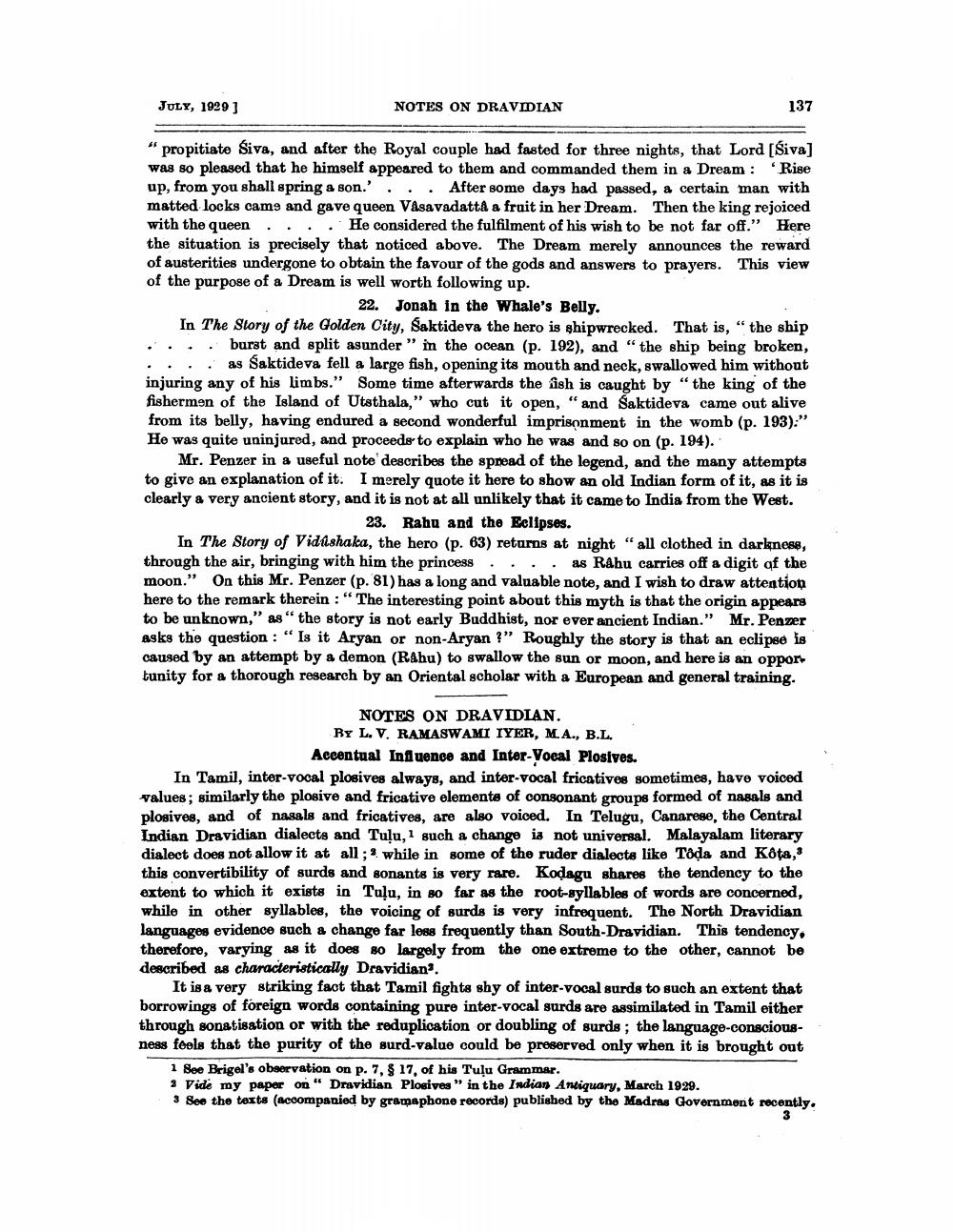________________
JULY, 1929 ]
NOTES ON DRAVIDIAN
137
"propitiate Siva, and after the Royal couple had fasted for three nights, that Lord [siva] was so pleased that he himself appeared to them and commanded them in a Dream: 'Rise up, from you shall spring a son.' ... After some days had passed, a certain man with matted locks came and gave queen Vasavadatta a fruit in her Dream. Then the king rejoiced with the queen ....He considered the fulfilment of his wish to be not far off." Here the situation is precisely that noticed above. The Dream merely announces the reward of austerities undergone to obtain the favour of the gods and answers to prayers. This view of the purpose of a Dream is well worth following up.
22. Jonah in the Whale's Belly. In The Story of the Golden City, Saktideva the hero is shipwrecked. That is," the ship .... burst and split asunder" in the ocean (p. 192), and "the ship being broken, ... as Saktideva fell a large fish, opening its mouth and neck, swallowed him without injuring any of his limbs.” Some time afterwards the ash is caught by “the king of the fishermen of the Island of Utsthala," who cut it open, "and Saktideva came out alive from its belly, having endured a second wonderful imprisonment in the womb (p. 193)." He was quite uninjured, and proceeds to explain who he was and so on (p. 194).
Mr. Penzer in a useful note describes the spread of the legend, and the many attempts to give an explanation of it. I merely quote it here to show an old Indian form of it, as it is clearly a very ancient story, and it is not at all unlikely that it came to India from the West.
23. Rahu and the Eclipses. In The Story of Vidishaka, the hero (p. 63) returns at night "all clothed in darknese, through the air, bringing with him the princess... as Rahu carries off a digit qf the moon.” On this Mr. Penzer (p. 81) has a long and valuable note, and I wish to draw attention here to the remark therein : "The interesting point about this myth is that the origin appears to be unknown," as "the story is not early Buddhist, nor ever ancient Indian." Mr. Penzer agks the question: "Is it Aryan or non-Aryan ?" Roughly the story is that an eclipse is caused by an attempt by a demon (Rahu) to swallow the sun or moon, and here is an oppor. tunity for a thorough research by an Oriental scholar with a European and general training.
NOTES ON DRAVIDLAN. By L. V. RAMASWAMI IYER, M.A., B.L
Accentual Influence and Inter-Vocal Plosives. In Tamil, inter-vocal plosives always, and inter-vocal fricatives sometimes, have voiced values; similarly the plosive and fricative elements of consonant groups formed of nasals and plosives, and of nasals and fricatives, are also voiced. In Telugu, Canarese, the Central Indian Dravidian dialects and Tulu, 1 such a change is not universal. Malayalam literary dialect does not allow it at all ;? while in some of the ruder dialects like Toda and Kota, this convertibility of surds and sonants is very rare. Kodagu shares the tendency to the extent to which it exists in Tuļu, in so far as the root-syllables of words are concerned, while in other syllables, the voicing of surds is very infrequent. The North Dravidian languages evidence such a change far less frequently than South-Dravidian. This tendency, therefore, varying as it does 80 largely from the one extreme to the other, cannot be described as characteristically Dravidian.
It is a very striking fact that Tamil fights shy of inter-vocal surds to such an extent that borrowings of foreign words containing pure inter-vocal gurds are assimilated in Tamil either through sonatisation or with the reduplication or doubling of surds; the language-consciousness feels that the purity of the surd-value could be preserved only when it is brought out
1 See Brigel's observation on p. 7, $ 17, of his Tulu Grammar. 3 Vide my paper on" Dravidian Plosives” in the Indian Antiquary, March 1929. 3 See the texts (companied by gramaphone records) published by the Madras Government recently.




